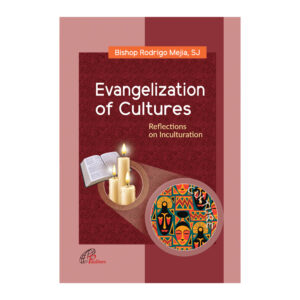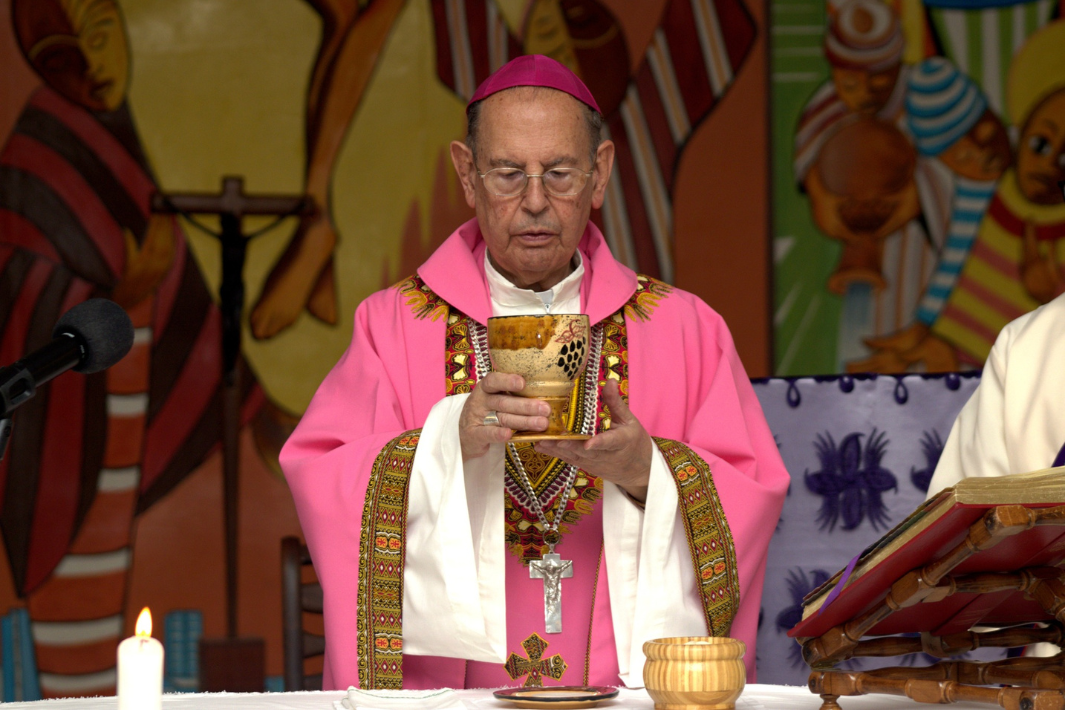By Paschal Norbert
NAIROBI, FEBRUARY 11, 2025 (CISA) – On January 29, 2025, Hekima University College (HUC) hosted an illuminating conference titled “The Future of African Theology in a Continent Longing for a New World Order.” Among the distinguished speakers was Rt Rev Rodrigo Mejia SJ, Emeritus Vicar Apostolic of Sodo, Ethiopia. A scholar, missionary, and theologian who has spent six decades in Africa, Bishop Mejia delivered a compelling speech, proposing a transformative and uniquely African approach to theology. His address resonated deeply with the audience, offering a profound exploration of theology’s role in shaping African societies amidst global shifts.
Bishop Mejia opened his speech with a reflection on his own journey, acknowledging his initial hesitation in accepting the Chair of African Theology at HUC.
“I was not born in Africa like Elsa the Lioness,” he humorously remarked, adding “However, I have lived here for 60 of my 87 years, and this lived experience is my only justification for being here.” Despite his foreign origins, his deep immersion in the African experience provided him with the insights to engage meaningfully in theological discourse.
Expanding on Bishop Matthew Hassan Kukah’s reflections, he emphasized the need for African theology to respond to pressing socio-political challenges. Employing the powerful metaphor of yeast, he illustrated theology’s potential to bring transformation.
“Yeast is small and seemingly insignificant, yet it transforms the entire dough,” he explained, noting that “African theology must function similarly- to be the yeast that transforms cultures and societies, embedding within them the values of the Kingdom of God: truth, life, holiness, grace, justice, love, and peace.”
Bishop Mejia asserted that the transformative power of theology lies in evangelization. However, he challenged traditional approaches, criticizing the prevailing academic focus that isolates theology from practical ministry.
“The problem is that we have developed theology for academic purposes, to earn diplomas and become doctors of theology, but not for evangelization,” he noted, arguing “The evangelizers are in parishes, while theologians remain in institutions, leading to a disconnect.”
He called for a redefinition of evangelization, urging scholars to revisit Evangelii Nuntiandi, the apostolic exhortation issued on December 8, 1975, by Pope Paul VI on the theme of Catholic evangelization. It describes evangelization as the interior transformation of society through the Gospel.
Citing an encounter with Pope Francis, Bishop Mejia highlighted the importance of continuity in evangelization. He recalled how Pope Francis, when asked how he managed to write The Joy of the Gospel despite his many responsibilities, responded with a smile, saying, “No, no, The Joy of the Gospel was a pleasure. I simply continued the message and energy of Evangelii Nuntiandi.” This anecdote underscored that evangelization is not just about instruction but about transformation.
A significant portion of Bishop Mejia’s speech critiqued the rigid methodologies in theological education. He traced historical influences back to medieval theology, which emphasized abstract questions rather than lived realities.
“The Bible was often used merely to prove predetermined answers,” he observed. “As a result, theologians became scholars providing elaborate answers to questions no one was asking.” He posed a critical question to African theologians: “To which questions are we responding?” He noted that while African cultures embrace celebration, theology must go beyond cultural expressions to achieve societal transformation.
In his book Evangelization of Cultures: Reflections on Inculturation, Bishop Mejia explores how culture shapes theological perspectives.

“Culture is not something we merely belong to; it shapes our thinking, debating, and living,” he asserted.
He emphasized the necessity for theology to evolve with each generation, warning that quoting theological authorities alone is no longer sufficient in a digital world. Instead, theology must start with real-life experiences and concerns.
He praised the 2020 revision of the Pontifical Council’s catechetical directory, which advocates for contextual theological education. Reflecting on Hekima’s introduction of pastoral fieldwork, he recounted student resistance, with some arguing that fieldwork was for catechists, not theologians. However, over time, practical theological engagement became widely accepted, proving its necessity in forming relevant theological thought.
Addressing the role of the Church in social issues, Bishop Mejia cited his research on the pastoral letters of Kenyan bishops from 1962 to 1995. He found that while their messages provided moral guidance, they often lacked depth in addressing contemporary realities.
He recalled a striking moment in 1976 when Jomo Kenyatta, Kenya’s founding president, challenged bishops at an AMECEA meeting: “We expect you to be the conscience of society. We, as leaders, may go wrong, but if you do not tell us where we are going wrong, then it is your fault.” This statement underscored the Church’s responsibility to provide moral and social guidance.
To bridge the gap between theology and contemporary reality, Bishop Mejia advocated for a theological approach inspired by Dietrich Bonhoeffer, a German Lutheran martyr, who advised his students to prepare their homilies with the Bible in one hand and a newspaper in the other. “The greatest challenge of our time is the growing divide between the Gospel and culture,” he stated, warning “If evangelization is to be meaningful, this divide must be bridged.”
Concluding his address, Bishop Mejia presented a bold vision for African theology: “I propose a uniquely African approach to teaching theology, one rooted in dialogue and contextual experience rather than rigid academic traditions.”
He emphasized that theology should not impose knowledge from above but should begin by listening to people’s lived experiences. “As a theologian, I may have extensive doctrinal knowledge, but every individual is an expert in their own problems. True theological reflection must begin with these problems, with the Bible serving as a response rather than a starting point.”
Applying the pastoral circle – starting with reality, analyzing it theologically, and formulating a praxis- can enhance both theological education and evangelization. Echoing Pope Paul VI’s message at CELAM in 1968, he concluded with a call to action: “Africans, you must be your own missionaries.” Extending this thought, he urged, “African theologians, you must transform your own culture.”
